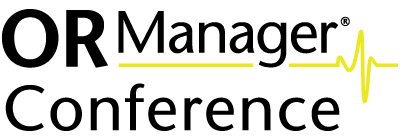
Editor's Note In this panel discussion, Cindy Hess, MSN, RN, FNP-C, CNAMB, director of nursing at Northeast Missouri Ambulatory Surgery Center; Vikram Tiwari, PhD, senior director and associate professor of anesthesiology, biomedical informatics, and biostatistics at Vanderbilt University; and Brian Dawson, MSN, RN, CNOR, CSSM, senior perioperative and healthcare consultant…

Editor's Note “I can't believe I'm about to take my last breath,” is what Allison Massari, executive coach, burn survivor, and the closing keynote speaker of this year’s OR Manager Conference, said she thought while she was stuck in a burning car after a horrible head-on collision. She had just…

Editor's Note Mental health educator Sheila-Robinson Kiss, MSW, LCSW, led OR Manager Conference attendees through an interactive session of strategic life planning during an energetic opening keynote session Monday morning. Titled “The Four Keys to Sustain Resilience - The Power of Safeguarding Your Mental Health,” the session focused specifically on…

Editor's Note In honor of World Mental Health Day October 10, the American Nurses Foundation announced a free curriculum for improving nurse support and well-being. The free curriculum is available to all nurses. It includes an overview, a training guide for nurse leaders, an implementation guide, and the complete course,…

Editor's Note Spatial computing technology could enhance surgical precision and ergonomics, according to a September 16 announcement published in EurekAlert! The report covers how surgeons at UC San Diego Health are pioneering the use of Apple Vision Pro in the OR to evaluate its potential for displaying medical imaging, vital…

Editor's Note The October 1 vice presidential debate showcased sharp divisions between the candidates on healthcare policy, focusing primarily on the future of the Affordable Care Act (ACA) and reproductive rights. A summary published October 2 in Stat details how Sen. JD Vance (R-Ohio) proposed changes that could allow insurers…

Editor's Note Research suggests parathyroidectomy may not provide a mental health benefit for PHPT patients, particularly in the context of preventing new depression. Published September 4 in JAMA Surgery, the study examined 40,231 adults with primary hyperparathyroidism (PHPT), revealing that early parathyroidectomy does not reduce the risk of developing new…

Takeaways Providers are generally seeking to reduce use of travelers through strategies such as float pools, training programs, and cultural reforms. However, travelers remain useful as a bridge to permanent staff and for difficult-to-fill positions. Best practices for selection, onboarding, team integration, and performance evaluation are essential for maximizing return…

Editor's Note Simple, non-judgmental interactions with therapy dogs could offer a valuable tool in combatting the widespread burnout seen across the healthcare industry. That’s according to a September 16 EurekAlert! news release detailing a study highlighting the emotional support benefits of therapy dogs for not only patients, but also the healthcare…

Editor's Note A new report by Mercer projects a national surplus of 30,000 nurses by 2028, but significant shortages will remain in some states and rural areas where healthcare access is already limited, according to a September 15 report in MedCity News. For example, New York is projected to face…